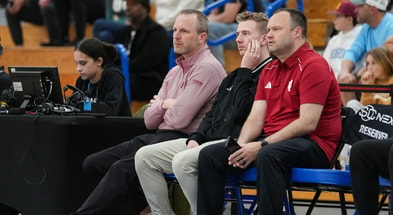Indiana baseball's costly mistakes prove too much against No. 18 Louisville

BLOOMINGTON, Ind. — Some games are lost because the opponent is simply better. Others, like Indiana baseball’s deflating defeat against Louisville, are lost before the opponent has a chance to win.
If you don’t give yourself a chance to win, you won’t. That was the painful lesson Indiana learned Tuesday night at Bart Kaufman Field. In a game that should have been theirs, a cascade of mistakes doomed the Hoosiers to a 6-4 defeat at the hands of No. 18 Louisville.
The true culprit behind the loss wasn’t just the team in red and black—it was Indiana’s own inability to get out of its own way. It was a night of missed opportunities, defensive blunders and ill-timed mistakes—an avalanche of self-inflicted wounds that ultimately cost Indiana any real shot at victory.
Five errors—more than the team had committed in any game in nearly three years—gifted the Cardinals four unearned runs, with the most damaging coming in a brutal eighth-inning collapse.
The Hoosiers held a 4-2 lead heading into that fateful frame, and veteran reliever Pete Haas was rolling. Then, everything unraveled.
A throwing error by sophomore catcher T.J. Schuyler gave Louisville an opening, trimming the lead to one. Haas induced what should have been an inning-ending groundout, but freshman shortstop Cooper Malamazian sailed the throw wide of first. Moments later, Louisville’s Eddie King Jr. capitalized, sending a hanging breaking ball deep into the night for a two-run homer that flipped the game on its head.
Indiana head coach Jeff Mercer didn’t mince words after the game.
“If you want to beat great teams, you have to play really good baseball,” Mercer said. “We were a very active participant in beating ourselves, and that part’s frustrating.”
The numbers were damning: five defensive errors, four unearned runs and just four hits. It was a game Indiana could have, and arguably should have, won. Instead, the Hoosiers watched as Louisville celebrated a victory they hadn’t needed to earn as much as Indiana had simply handed it over.
Simple plays turned into self-inflicted wounds. Mercer pointed out that none of the errors occurred on difficult plays.
They were routine—throws to first, a pickoff attempt, fundamental moments that should have been executed cleanly. Instead, each mistake compounded the pressure and invited Louisville back into the game.
“It’s frustrating that we made some of the ‘kid’ mistakes that we made today,” Mercer said. “We’re a better defensive team; we’ve been a better defensive team than that.”
The defensive miscues were costly, but Indiana’s problems weren’t limited to the field. The Hoosiers’ bats went silent after the fourth inning for the second straight game.
Top 10
- 1Breaking
Final AP Poll
Basketball Top 25 released
- 2Hot
Way-Too-Early Top 25
Looking ahead to 2025-26 hoops
- 3
Nick Saban
Nominated for Emmy
- 4Trending
Hailey Van Lith
Stuns as SI Swimsuit cover model
- 5
Jay Williams
Calls out refs in title game
Get the On3 Top 10 to your inbox every morning
By clicking "Subscribe to Newsletter", I agree to On3's Privacy Notice, Terms, and use of my personal information described therein.
Indiana managed just four hits, its second-fewest in a game all season. When opportunities presented themselves late, Indiana squandered them.
Junior outfielder Devin Taylor struck out with two runners on in the ninth. Then, freshman first baseman Jake Hanley had a chance to extend the game with the bases loaded but went down on strikes, sealing Indiana’s fate.
The Hoosiers’ pitching staff did enough to win. They held a top-20 opponent to six hits and two earned runs. The bullpen surrendered only one earned run in seven innings of work.
Outside of the eighth-inning homer, Louisville had just one extra-base hit all night. But when the defense gives away runs and the offense fails to capitalize, even strong pitching performances aren’t enough to overcome those shortcomings.
“The reality is, you have to be able to—as a group, collectively—look in the mirror and say, ‘OK, we didn’t execute very well today,’” Mercer said. “We didn’t take care of the ball. We didn’t give ourselves a chance to win because of what we did in the batter’s box and what we did defensively.”
Mercer understands this is a young team. The Hoosiers are relying on underclassmen in big roles, and growing pains are to be expected.
But Tuesday’s game wasn’t about youth—it was about fundamentals. Indiana didn’t lose because it was overmatched by a ranked opponent. The Hoosiers lost because they failed to execute the little things.
That’s what made the loss so frustrating.
“I get these guys are young,” Mercer said. “But at some point, you have to take the next step and advance the way you play the game. We have to advance in the way that we play from a fundamental standpoint.”



